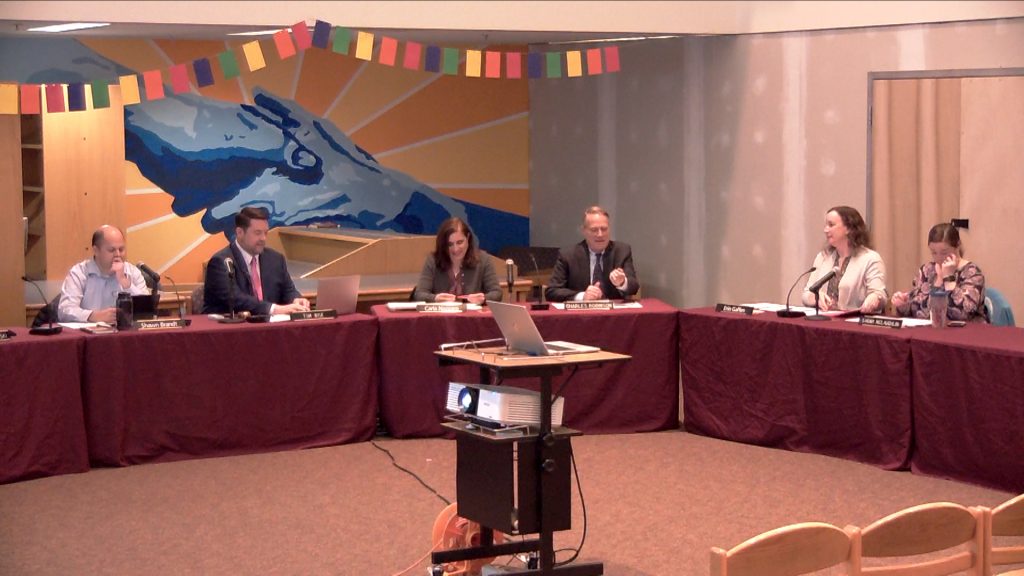Reading, MA — In a change of direction from the past and by a 6-0 vote, the School Committee voted to approve participation in the state’s school choice program for the 2022-2023 school year. This would allow students who live in other school districts to enter a lottery to attend Reading Public Schools. The administration will determine how many spaces are available at each grade level and which schools. Director of Finance Susan Bottan shared that expected enrollment for the 2022-2023 school year currently is seventy-one students below what was originally anticipated, with most of those seats available in the secondary levels. Bottan shared that the state will grant $5,000 per student from outside the district enrolled in Reading Public Schools, which can be used in any way the School Committee sees fit. Additionally, the district would be reimbursed 100% for any direct, special education services incurred by the new students and between 49% and 100% for indirect special education services needed by the new students. The committee can opt-out of school choice on an annual basis, though any students admitted remain through graduation.

Bottan recommended the change for the financial benefits as well as the opportunity to “smooth out” bubble classes which create shifts in staffing from year to year, thereby creating more staff consistency. Children of Reading Public Schools staff could also enter the lottery, possibly allowing them to attend the schools in which their parents work. The decision will cause the School Committee to reevaluate its policy on the issue in regards to sibling policies and other matters.
The school choice decision came on the heels of Bottan sharing that, to date, 230 students are enrolled for next year’s kindergarten classes, twenty students below projections. Two hundred eighteen of these are enrolled in the full-day program. Of the twelve students enrolled in the half day program town-wide, only three of those students are enrolled at the Joshua Eaton Elementary School. The administration intends to close the half-day program at Joshua Eaton and work with those three families on alternatives. Superintendent of Schools Thomas Milaschewski was quick to point out that there will be no reduction in staffing and that the staff previously assigned to that class will be reassigned as needed.
Last Day of School
By a vote of 6-0, the School Committee accepted the Superintendent’s recommendation for June 21 to be the last day of school. Milachewski noted that although ending school on a Tuesday after the Monday recognition of Juneteenth was not ideal, it was the best schedule they could determine based on the two snow days used during the winter.
RMHS Track
The School Committee also voted 6-0 to accept the nomination to name the Reading Memorial High School track after long-term coach and teacher Hal Croft. An RMHS Track Renaming Committee was formed and School Committee member Chuck Robinson was named to represent the School Committee on the renaming committee. The renaming committee will review the nomination and offer a recommendation regarding the field’s naming to the School Committee. Croft’s service in the United States Marine Corps included his receiving the award of both a bronze star and a silver star for valor. As a track coach, Croft’s teams won 262 straight matches over a thirty-year career. Croft was also noted as an effective teacher in the classroom. “I am an English teacher first,” Nominator Carl McFadden stated at the March 24 School Committee meeting, quoting Croft from a Sports Illustrated article.
Literacy Grant
Assistant Superintendent for Teaching and Learning Sarah Hardy presented a literacy update in which she shared that since the $200,000 literacy grant the district received needs to be spent by June 31, the timeline for evaluating a new literacy curriculum has been accelerated. Hardy stated that the district goal that “all students will be grade-level readers” has been impeded by the curriculum.
“According to Ed Report,” Milaschewski shared, “the current curriculum is insufficient.”
According to Hardy, additional funding may be needed as the grant will only fund three grade levels of a new literacy curriculum. This potential inequity raised concerns for School Committee member Erin Gaffen who asked if this would affect which curricula are chosen. Hardy responded, “Our lens is to get the best program in place.”
Beyond that, Hardy reported, additional funding may also be needed for support as teachers transition. School Committee chair Thomas Wise suggested that American Rescue Plan Act funding could possibly be used to make up the difference.
Student Services
Director of Student Services Jennifer Stys and Director of Special Education Alison Wright provided the committee with a student services update as well. In the presentation, the team described advances made in best practices for students with reading and executive functioning issues, social and emotional learning best practices under development, and improvements in operational systems, which focused on changes in how attendance issues are handled. There is also a comprehensive review underway of several in-district special education programs. Stys further emphasized the development of community partnerships with other organizations such as the YMCA, Austin Preparatory School, local preschool partners, and the Reading Coalition for Prevention and Support.
There are currently 777 Reading Public Schools students with individual learning plans in the district and fifty-seven with out-of-district placements.
The School Committee adjourned at 10:15 pm.

